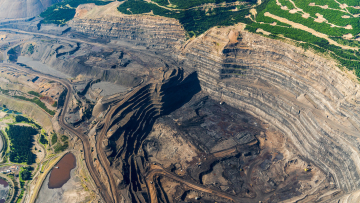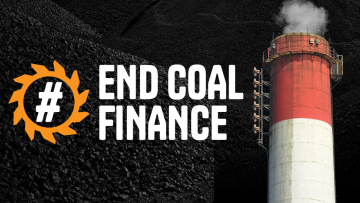
Company – Active
This profile is actively maintainedBankTrack
Julia Hovenier, Banks and steel campaigner, BankTrack

Company – Active
This profile is actively maintainedBankTrack
Julia Hovenier, Banks and steel campaigner, BankTrack
Why this profile?
JSW Steel is expanding its steelmaking and coal mining operations to the detriment of communities, nature and the climate. Rather than invest in fossil-free steelmaking, the company is building new coal mines, coal-fired power plants, and coal-fired steel furnaces, and violating communities right to land, a healthy and safe environment, and a stable livelihood in the process.
What must happen
The financiers of JSW Steel must:
-
not provide any financial services for the JSW Utkal Steel Limited project,
-
ensure that JSW Steel respects human rights throughout its operations; complies with domestic law; and seeks to prevent or mitigate adverse human rights impacts that are linked to its operations, and
-
using an escalation plan, engage with the company on its climate transition plan to ensure alignment to the Paris Agreement, which means no new blast furnaces, and no expansion of coal mines, or purchasing of new mines.
In the event that JSW Steel does not fully comply with human rights standards and the Paris Agreement, financiers must consider ending all financial services for JSW Steel.
| Sectors | Iron and Steel Manufacturing , Coal Electric Power Generation, Coal Mining, Construction |
| Headquarters |
|
| Ownership |
listed on National Stock Exchange of India
JSW Steel is primarily owned by its parent company, the Jindal Group (28%). The next largest shareholders are Japan's JFE Steel Corporation (15%), and the Life Insurance Corporation of India (6.3%). |
| Subsidiaries |
JSW Infrastructure Ltd – India
JSW Utkal Steel Ltd – India |
| Website | https://www.jsw.in/ |
JSW Steel, based in Mumbai, India, is the second-largest steel manufacturer in India, and the twelfth largest in the world. It is a subsidiary of the JSW Group, a USD 24 billion Indian multinational dealing in energy, cement, paint, infrastructure, and venture capital. JSW Steel operates 13 steel plants, 11 in India, one in the United States, and one in Italy. To supply its own raw materials, it additionally operates 12 iron ore mines and three metallurgical coal mines in India. JSW Steel is a leading supplier to the automotive industry, selling to customers like Fiat, Piaggio, and Ford. According to Global Energy Monitor, 66% of JSW Steel’s crude steelmaking capacity is coal based.
Impact on human rights and communities
Displacing communities without appropriate compensation: JSW Steel's expansion into Jagatsinghpur, Odisha, has led to the forced displacement of local villagers. The villagers, who have lived and depended on the land for generations, have a right to the land under The Scheduled Tribes and Other Traditional Forest Dwellers (Recognition of Forest Rights) Act of 2006. The acquisition process, intended to build a new 13.2 million tonnes per annum (MTPA) capacity steel plant, did not involve adequate consultation with affected residents, nor did it provide fair compensation or proper resettlement plans. Villagers from Dhinkia, Odisha and surrounding areas have protested vehemently against the land acquisition, resulting in violent clashes with authorities. The loss of land has not only deprived them of their homes but also their means of income, leading to increased poverty and social instability.
Criminalisation of human rights defenders There have been several documented incidents of attacks on human rights defenders and people peacefully opposing the construction of the JSW Utkal Steel plant:
-
14 January 2022: Narendra Mohanty, Debendra Swain and Muralidhar Sahoo were arrested by police officers for joining a peaceful protest.
-
19 Feb 2022: Pradeep Satpathy and other defenders, along with Dhinkia villagers, were reportedly assaulted by a mob in the presence of the police and senior administrative officials. They were on their way to meet a High-Court appointed committee of lawyers and to submit their concerns regarding the ongoing clampdowns in the name of acquiring land for JSW.
-
December 2022: Seven leaders of the Anti-Jindal Movement, Ms. Shanti Das, Mr. Abhaya Mallick, Mr. Dillip Kandi, Mr. Narayan Muduli, Mr. Hrudananda Rout, Mr. Megha Das, and Mr. Nutan Das were arrested.
-
20 November 2023: Police attacked a nine-month long peaceful protest against corporate mining in Gadchiroli District in India. They beat protestors, seized their mobile phones and belongings, destroyed huts and shelters, and detained 21 protestors.
When contacted for comment about these incidents by the Business and Human Rights Resource Centre in 2022, JSW Steel responded by saying that they are not responsible for the actions of the police. However, according to UN guidance, businesses like JSW Steel have a responsibility to mitigate the risk of attacks, support independent fact-finding missions, and provide access to remedy.
Potential risks to villagers’ health and right to a clean environment The proposed JSW Utkal Steel project-site currently has a Comprehensive Environmental Pollution Index (CEPI) score of 69.26, categorizing it as a severely polluted area. This indicates an already fragile environmental condition that could exacerbate health risks if a new steel plant and coal-fired power plant are built there. According to a January 2022 briefing by the Centre for Research on Energy and Clean Air, if built, the steel plant would greatly exceed air pollution limits set by the World Health Organisation and cause severe health issues among the local population.
Impact on climate
A major greenhouse gas emitter without a sufficient plan: Due to its reliance on coal-fired furnaces for steelmaking, and coal-fired power stations for energy production, JSW Steel is a major CO2 emitter. For every ton of steel JSW produces, it releases 2.36 tonnes of CO2. This emissions' intensity is much higher compared to the global average of 1.95 tonnes of CO2 per tonne of steel, or even India’s average of 2.0 Mt CO/ton of steel. While JSW has published a Climate Action Plan, it only has set a 2030, and 2050 emissions reduction targets for its emissions' intensity, not it’s absolute emissions. The climate targets do not cover scope 3 emissions. Additionally, the focus of the climate action plan is only on CO2 emissions, but as an owner of several coal mines, JSW must also report on and mitigate its coal mine methane, which could increase the impact of its climate impact by 27%.
Still investing in burning coal: In order for the steel industry to stay in line with the Paris Agreement’s 1.5°C pathway, no new blast furnaces without carbon capture, utilization, and storage (CCUS) that is at least 90% effective, should come online after 2025. Despite this, JSW has announced plans to build seven new coal-fired blast furnaces, all to come online by 2036. Blast Furnaces have an average lifespan of 20 years, meaning these coal-fired furnaces will be operating into the 2050s. Additionally, JSW Steel has announced a plan to construct a captive coal-fired power plant at the JSW Utkal Steel project.
Still investing in coal mining: According to the IEA, the current supply of metallurgical coal is sufficient to meet demand until 2050. Buying, building, or expanding new coal mines would jeopardise the climate goals of JSW Steel and it’s financiers. In an effort to secure a coal supply for blast furnace based steelmaking, JSW is pursuing an aggressive strategy to buy up the world's metallurgical coal mines. It is currently trying to purchase either full ownership, or large stakes in mines and greenfield development sites in Mozambique, Australia, and India. Additionally, JSW Steel has been listed on Urgewalds metallurgical coal exit list for its plans to develop two new coal mines in India: Sitanala Coal Mine, and the Parbatpur Central Coal Block.
Investing in false solutions to steel decarbonisation: JSW has partnered with BHP to explore the use of Carbon Capture Utilisation and Storage (CCUS) technologies as a decarbonisation pathway. CCUS has a history of underperforming in similarly “hard-to-abate” sectors, and further perpetuates coal-based steel production when alternative production routes exist. Additionally, CCUS does not capture other harmful emissions likely to come from the steel plant, or the methane emitted when mining coking coal.
Impact on nature and environment
Clearing forests for development: The construction of the JSW Utkal Steel (JUSL) project requires clear-cutting hundreds of acres of forest land. Photos from locals demonstrate that JSW Steel has begun the clear-cutting process without receiving environmental clearance to do so. Additionally, the project includes the construction of a port, for which mangrove forests and sand dunes would need to be cleared. This would destroy a fragile ecosystem that sustains both marine and human life. The mangrove forests and sand dunes naturally protect the area from monsoons and cyclonic activities: Next to numerous fish and crab species, the coastline also hosts the largest mass nesting of Olive Ridley sea turtles, an endangered species whose population is decreasing globally, and whose nesting areas are protected. The Indian government’s international legal obligation to protect this species and its nesting beaches, breeding, feeding and congregation areas, may not be met if the JUSL project proceeds.
Threats to essential water bodies: If the JSW Utkal Steel plant gets built, the quality and free flowing nature of the Mahanadi river would be threatened. JSW Steel’s proposed plant would use vast amounts of water from the river for industrial cooling, while discharging effluents, jeopardising the water quality. The Mahanadi river is the primary source of drinking water for local villagers. Constructing this steel plant would not only threaten crucial river ecosystems, but also threaten the right to water.
According to the ‘Banking on Climate Chaos’ report, between 2017 and 2023, JSW Steel received USD 250 million in finance from some of the 60 banks covered in the report. The top three financiers of JSW Steel were State Bank of India (USD 39.77 million), BNP Paribas (USD 32.31 million), and Standard Chartered (USD 30.67 million).
Additionally, In 2022 JSW Steel’s parent company, Indian conglomerate JSW Group, raised $1.6 billion through a sustainability linked bond (SLB), of which $500 million is earmarked for JSW Steel. Credit Suisse (now UBS) was the main structuring agent, as well as joint lead and book runners with Deutsche Bank, Standard Chartered, Axis Bank, BNP Paribas, Mizuho, MUFG and State Bank of India.
2025
2025-02-18 00:00:00 | POSCO & JSW Steel sign an MOU to build a new steel plant in India
POSCO and JSW Steel have signed an MOU for the development of an integrated steel plant in India with an initial capacity of 5 million tonnes per annum. While the technology and the location of the steel plant are still unknown, POSCO's reentry into the Indian steel market is controversial. In 2013 POSCO sought to establish an integrated steel venture in India's eastern state of Odisha. It was meet with years of significant and sustained opposition from affected communities, who have used non-violent protest and democratic processes to resist their forced evictions from lands. In 2017, POSCO withdrew from the project, and the land was handed over by the Indian government to JSW Steel instead. The land was undisturbed by JSW Steel until 2022, when they began land clearing for the development of a new steel plant.



